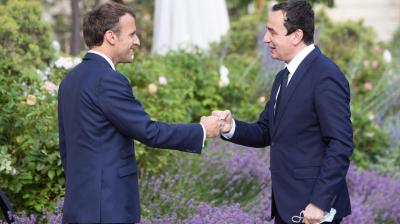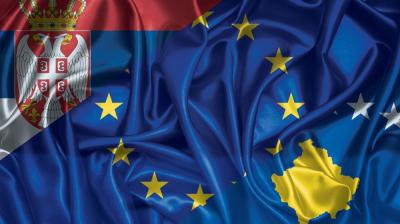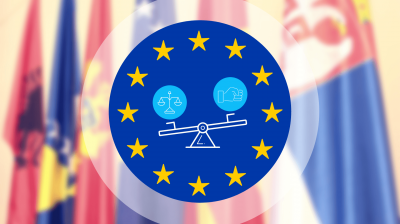Dutch Parliament demands geopolitical alignment in EU enlargement
The Dutch Parliament has been known for its close scrutiny of Rule of Law reforms within the EU accession processes of the South-East Europe Six (Albania, Bosnia and Herzegovina, Kosovo, North Macedonia, Montenegro, and Serbia). However, following the Russian invasion of Ukraine, it now assigns equal importance to the geopolitical alignment of these countries. This is a welcome and necessary development, as aspiring member states must be held accountable for their foreign policy actions.
For years, the Dutch Parliament has, through its parliamentary resolutions and questions to the Dutch government, closely concentrated on Rule of Law requirements within the EU accession process. Resulting demands often went beyond the formal conclusions of the European Commission annual country reports that trace reform developments in aspiring member states.
Dutch parliamentarians, for example, rejected the opening of enlargement negotiations with Albania in June 2019, despite a positive European Commission assessment on opening negotiations. This approach has led to the Netherlands being viewed as one of the most sceptical EU member states regarding EU enlargement, even if its ‘strict and fair’ approach has also been welcomed by NGOs and reformist politicians in the region.
But in time to come, governments in the South-East Europe Six can expect close scrutiny from the Netherlands on another topic as well: EU Common Foreign and Security Policy (CFSP) alignment. This means alignment with EU foreign policy positions, for example regarding sanctions.
Aligning with EU foreign policy
In December 2022, a member of prime-minister Mark Rutte’s Liberal Party (VVD) initiated a resolution requesting the Dutch government to plead for new instruments that allow the European Union to trace CFSP commonality and freeze negotiations when backlashes occur. It was adopted even if such steps are already possible within the current revised enlargement methodology, that has been in place since 2020.
A quick peek at the resolution shows it was clearly directed towards Serbia, explicitly citing the country’s failure to align with EU sanctions against Russia. Mainly as a result of this foreign policy divergence, the country’s alignment rate with EU foreign policy decisions dropped from 64% in 2021 to just 45% last year.
Serbia is the country in the region most keen on balancing its formal EU accession trajectory with friendly relations with the Russian Federation. Besides the cultural narrative of pan-Slavism and a common Orthodox religion, Serbia’s openness to Russia largely results from Moscow’s support for Belgrade’s stance on the Kosovo issue. At the same time, Serbia’s geopolitical attitudes towards the wider ‘West’ are still influenced by the country’s collective trauma over the NATO bombings of Belgrade that ended the Kosovo conflict in 1999.
The Russian invasion of Ukraine has made Serbia’s balancing act a lot tougher. The EU, and especially the Netherlands, is not in the mood for complacency, as last week’s developments in the Dutch Parliament show. VVD Members of Parliament Ruben Brekelmans and Jeroen van Wijngaarden asked critical questions about the alleged opening of a Wagner Group cultural centre in Belgrade on the 24th of January 2023. They requested that Foreign Minister Wopke Hoekstra sheds light on the extent to which Serbia facilitates Wagner activities.
EU foreign policy alignment of the South-East Europe Six will be under close scrutiny in the time to come
An important question indeed, as allowing the opening of a Wagner facility, a group with an appalling record of violence and human rights violations in Ukraine and across the globe, clearly goes against the European Union’s values. The MPs then moved quickly to ask Hoekstra to ‘push for the freezing of Serbian candidate membership if it turns out Serbia allows initiatives of the Wagner Group’.
Directly freezing accession negotiations is not necessarily the best step to affect change within Serbia’s foreign policy. Serbian President Aleksandar Vučić made clear he is firmly against Wagner recruiting Serbian citizens to fight in Ukraine, so nuance is needed. But the parliamentary questions attest to the Dutch parliaments’ geopolitical awakening following the Russian invasion of Ukraine. They show that EU foreign policy alignment of the South-East Europe Six will be under close scrutiny in the time to come, with underperformance risking a delay or even derailment of their EU accession path.
A more geopolitical assertive approach
That is about time. The Rule of Law is a reflection of EU norms and values and therefore key to the successful participation of any EU member state within the union. But the same also goes for EU foreign policy, which can be seen as the external reflection of the EU’s internal norms and values.
This more fierce EU approach is already having an effect. Serbian Foreign Minister Ivica Dačić indicated on the 25th of January that Serbia may impose sanctions on Russia after all.
The developments in the Dutch Parliament are just one example of an increased geopolitical assertiveness by the Netherlands and EU towards aligning the South-East Europe Six, and Serbia in particular, to the EU’s foundational beliefs. Last week, EU Special Representative Miroslav Lajčák urged President Vučić to accept a new EU negotiating proposal on the Kosovo issue or face a reversal of the country’s EU integration process. And in December 2022, after amongst others another Dutch parliamentary resolution, the EU demanded Balkan governments to appropriately adjust their visa requirements for third countries or face a suspension of the region’s own citizens ability to travel to the EU without a visa (with the exception of Kosovo, with which visa free travel will only commence later this year).
All in all, the EU is likely to continue a more geopolitical assertive approach towards the candidates, requiring a high level of alignment with its Common Foreign and Security Policy. In addition to its strictness on the Rule of Law, the Dutch Parliament may well look to enhance its status as the most active member state on foreign policy alignment.






